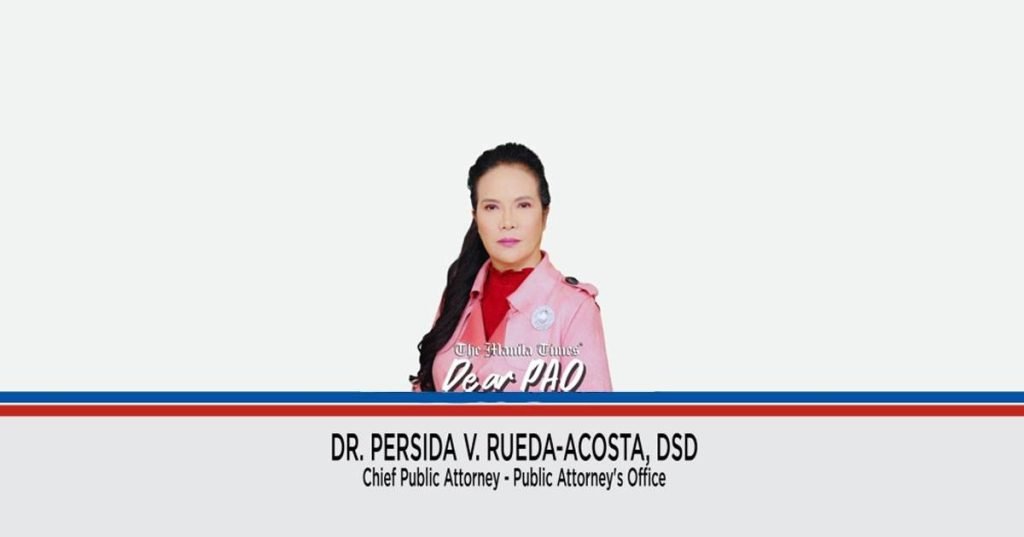
Dear PAO,
My eldest sibling, who is not very familiar with online transactions, was allegedly enticed to register an account in GCash to be bought/leased by another person. According to him, the offer is quite lucrative. As such, he told the person that he would think about the matter and would consult his relatives, who are more adept with technology than him. I advised my sibling to be careful since I am also unfamiliar with the possible repercussions. I informed him to hold off until we know that it is safe. Having said this, is it legal to sell/lease one’s GCash account? What may be the possible consequences of such an act? Again, the offer was lucrative, which is why we are being careful but not easily giving a hard pass.
Paula
Dear Paula,
For brevity, permit me to jointly discuss the answers to your questions for being interrelated. In view of this, please be advised of the provisions of a recently passed law which is the Republic Act (RA) 12010, otherwise known as the Anti-Financial Account Scamming Act (AFASA). In the said law, an e-wallet, which includes GCash, falls under the definition of a financial account as stated in Section 3 (d) thereof, viz.:
“(d) Financial Account refers to an account used to avail of products or services offered by Institutions such as:
“(1) An interest or non-interest-bearing deposit, trust, investment, or credit card account;
“(2) Other transaction account maintained with a bank, non-bank, or financial institution;
“(3) E-wallet; and
“(4) Any other account used to avail of financial products or services defined under Section 3(c) of Republic Act No. 11765 or the ‘Financial Products and Services Consumer Protection Act.'” (Emphasis and underscoring supplied)
Pertinent with the foregoing, Section 4 of the above-cited law defines and enumerates money-muling activities and is considered the same as prohibited acts:
“Section 4. Prohibited Acts. – The following acts shall constitute Financial Account scamming under this Act:
“(a) Money Muling Activities. – A person performing any of the following acts for the purpose of obtaining, receiving, depositing, transferring, or withdrawing proceeds that are known to be derived from crimes, offenses, or social engineering schemes shall be considered a money mule:
“(1) Using, borrowing or allowing the use of a Financial Account;
“(2) Opening a Financial Account under a fictitious name or using the identity or identification documents of another;
“(3) Buying or renting a Financial Account;
“(4) Selling or lending a Financial Account; or
“(5) Recruiting, enlisting, contracting, hiring, utilizing, or inducing any person to perform the acts mentioned in items 1 to 4 of this subsection.” (Emphasis and underscoring supplied)
Notably, the preceding dictates that both acts of selling or lending one’s financial account, such as an e-wallet or GCash, and the act of inducing any person to perform the act of selling or lending with the purpose of obtaining, receiving, depositing, transferring, or withdrawing proceeds that are known to be derived from crimes, offenses, or social engineering schemes are deemed as a money muling activity; a prohibited act and penalized by law.
To be concise, social engineering is also defined by law as a scheme committed by a person who obtains sensitive identifying information of another person through deception or fraud, resulting in unauthorized access and control over the person’s financial account, by performing any of the following acts: (1) Misrepresenting oneself as acting on behalf of an Institution or making false representations to solicit another person’s sensitive identifying information, or (2) Using electronic communications to obtain another person’s sensitive identifying information. (Section 4 (b), RA 12010)
Apart from the foregoing, even if the element of purpose constitutive of the crime of money muling is not satisfied, it must be noted that the mere act of buying or selling does not make it any less of a prohibited act since the law equally considers the sheer act as a punishable offense:
“Section 5. Other Offenses. – The following shall also constitute offenses under this Act:
“(a) Willfully aiding or abetting in the commission of any of the offenses enumerated under Section 4;
“(b) Willfully attempting to commit any of the offenses enumerated under Section 4;
“(c) Opening a Financial Account under a fictitious name or using the identity or identification documents of another; or
“(d) Buying or selling a Financial Account.” (Emphasis and underscoring supplied)
Thus, it is prudent on your end to advise your sibling to refrain from entering such transactions. Having learned the foregoing, it must be clear that the narrated transaction your brother almost entered may constitute a crime and must be reported to authorities.
We hope that we are able to answer your queries. This advice is based solely on the facts you have narrated and our appreciation of the same. Our opinion may vary when other facts are changed or elaborated.
Thank you for your continued trust and support.
Editor’s note: Dear PAO is a daily column of the Public Attorney’s Office. Questions for Chief Acosta may be sent to [email protected]







